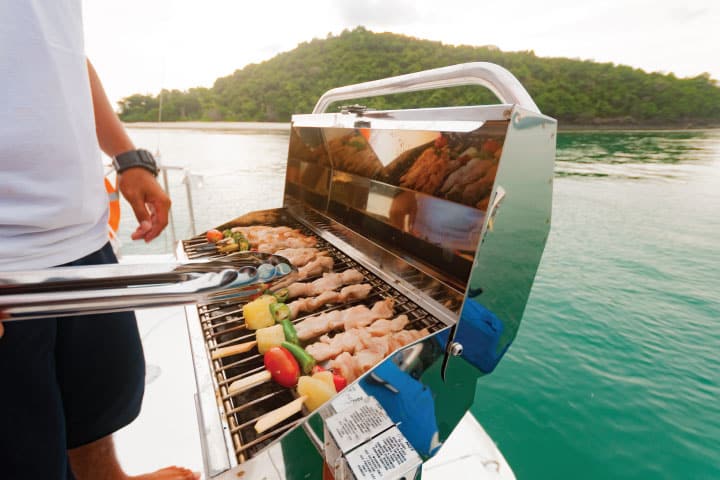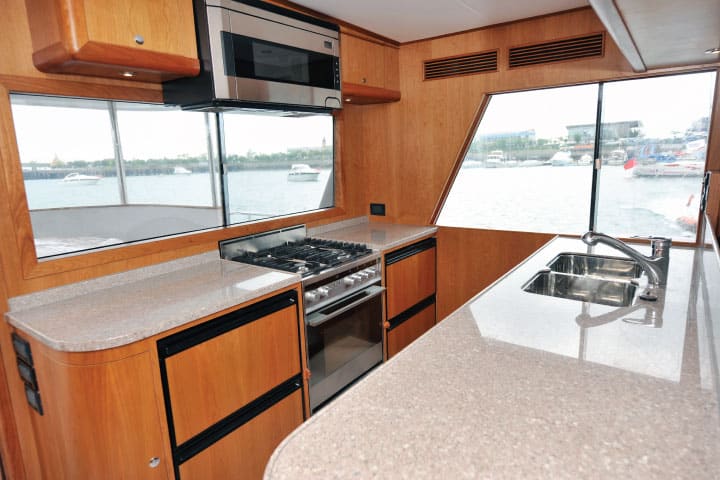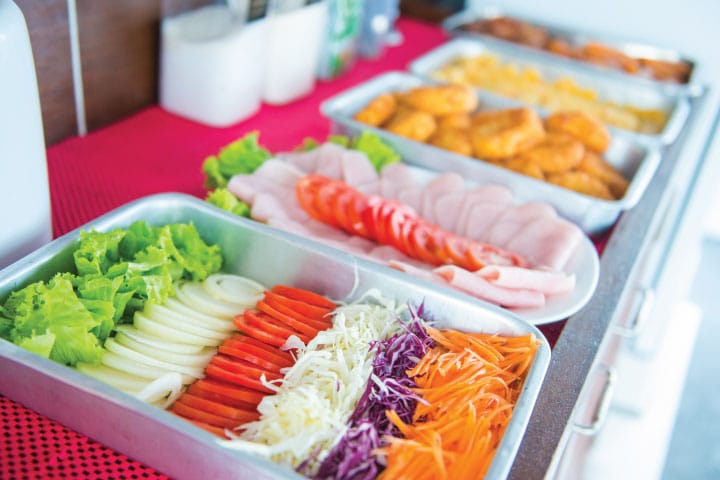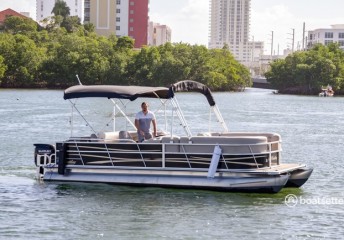9 Tips for Cooking on a Boat
Last Updated on August 17, 2023 by Boatsetter Team
Dock ‘n’ dining is one great way to spend your boat trip. But if you’re feeling a bit hands-on, like you’d like to cook something special yourself, there are plenty of boats where you can show off your cooking skills on board.
Here’s some tried-and-true advice, nine tips for cooking on a boat which will set you on the right course (pun fully intended):
- Check your galley gear
- Plan your menu before you leave home
- Prep foods in advance
- Catch your own dinner
- Get the small set involved
- Keep motion in mind
- Consider weather
- Don’t forget cleanup time
- Get a boat cookbook
Rent, Charter, Share— Only at Boatsetter
1. Check your galley gear
Before you do anything else, list what pots, pans, appliances, dishes, glassware, and utensils are aboard your boat. If you’re missing something you typically prep, cook, or serve with, pack it for your next outing and then add it to the list.
Simultaneously, it’s crucial to take note of your boat’s cabinet and counter space. You may not be able to take along your favorite electric can opener, for instance, so substitute a hand-operated one. Better yet, consider tools that can do double duty, like a can opener with a bottle opener.
Those of you with trailerable boats don’t have the luxury of a galley but can use a propane marine grill. Bonus: It makes for a great beach barbecue, too.

2. Plan your menu before you leave home
Keep it simple: the first time cooking on a boat isn’t the time to channel your inner Food Network chef. Again, be mindful of your onboard stowage, refrigeration space, and stove/oven/grill capacity. There’s no shame in using canned or otherwise packaged goods instead of all fresh foods when you’re facing limited space, either.
3. Prep foods in advance
Save yourself time by chopping, dicing, and slicing vegetables and fruits, for instance, while you’re still at home. The same goes for portioning meats and other proteins. Place everything in sealable, reusable plastic containers or zip-lock bags.
4. Catch your own dinner
Wetting a line over the side of your boat gives new meaning to shopping local. Plus, it’s an activity you can do with your kids.

5. Get the small set involved
Speaking of your kids, even kindergarten-aged children can participate in cooking on a boat. Assign everyone age-appropriate tasks, from prepping to assembling and serving. Similarly, consider letting your kids plan a day’s meal with you in advance, and even shop with you for ingredients.
6. Keep motion in mind
Cooking on a boat means you must contend with wind and waves. That said, never put down utensils like knives or full pots and pans where they could slide and hurt someone. In fact, it’s best to use items with non-slip handles and surfaces. Furthermore, leave all glassware back at home.
7. Consider weather
On hot days, heating up the galley (and therefore the rest of the interior) will be pretty uncomfortable. Instead, plan to prep and eat chilled foods or simple sandwiches and salads.

8. Don’t forget cleanup time!
Not all dish soaps are created equal. Stock all-natural and marine-safe dish soaps. White vinegar is your friend for cutting through greasy spills, too. Avoid household cleaners, like phosphate-based soaps, as they may be toxic to marine life.
9. Get a boat cookbook
Once you get the hang of cooking on a boat, expand your repertoire with any of the plethora of boating cookbooks. You’ll discover new recipes that soon may become family and guest favorites.
Making meals while on the water can come with challenges, we hope our nine tips make it easier for you.
About us
Boatsetter is a unique boat-sharing platform that gives everyone— whether you own a boat or you’re just renting— the chance to experience life on the water. You can list a boat, book a boat, or make money as a captain.
List. Rent. Earn— Only at Boatsetter

A journalist with more than 30 years’ experience, Diane M. Byrne is the owner
of MegayachtNews.com, a daily website educating American superyacht owners, buyers, and
their circles of influence about the leading builders, designers, cruising destinations, and more.
She founded the website in 2007 as the first, and still the only, American-focused online media
outlet exclusively covering this market. It features all-original content, for real stories of real
interest.
Diane is additionally one of the most-sought-after journalists for expert editorial coverage and
commentary about not only superyachts, but also general boating and yachting. Her byline
appears in Boatsetter.com, DiscoverBoating.com, and the magazines Luxury Guide, Ocean,
Yachting, and Yachts International.
Additionally, Diane is the Chair of the U.S. Superyacht Association, having been on the Board of
Directors since 2015. Outside of yachting, she’s a trustee of Sempre Avanti, a non-profit
resource supporting Italian and Italian-American individuals, businesses, and organizations in the
United States and Italy.










